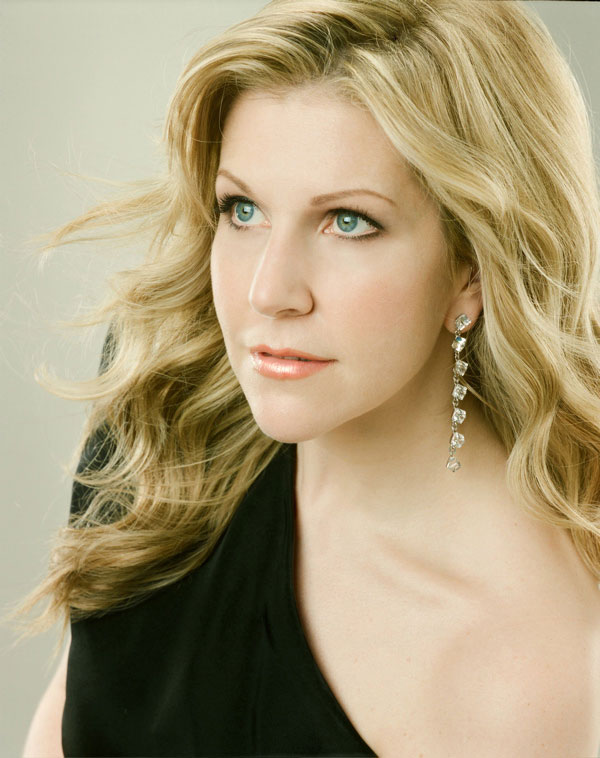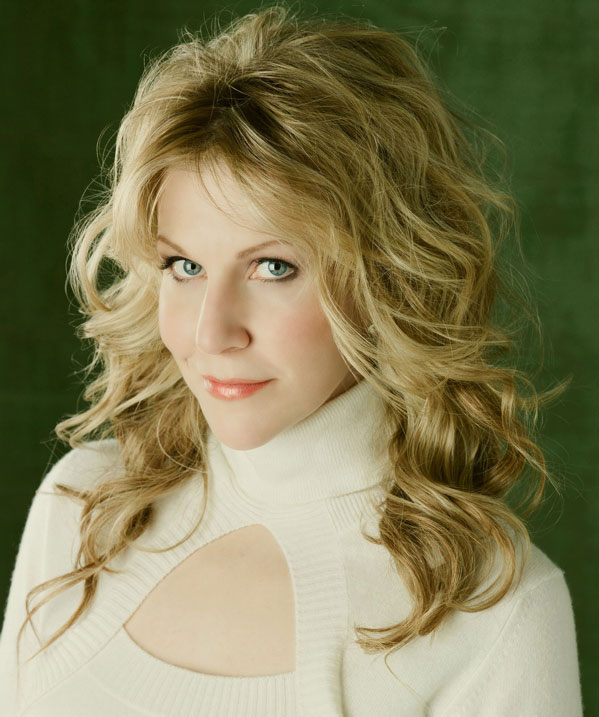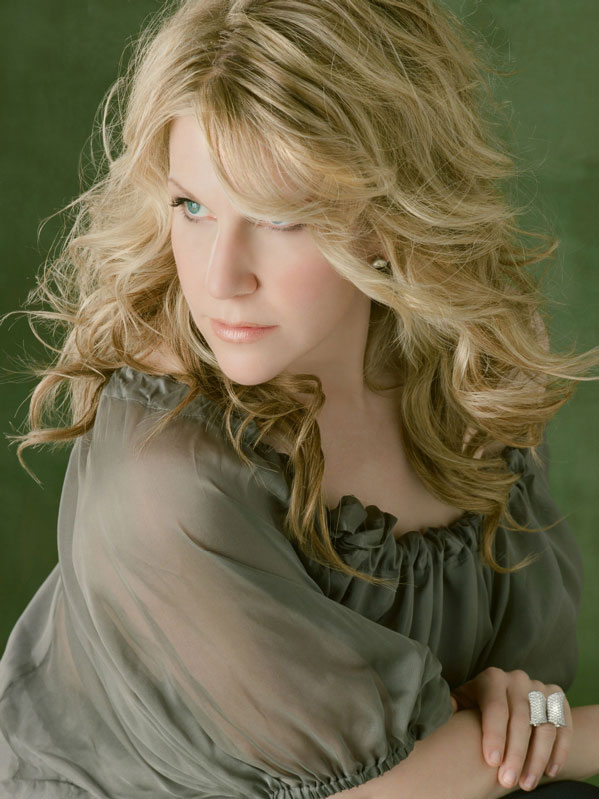
Thanks in part to her two recent EMI recital discs of the music of Handel and Rossini, mezzo-soprano Joyce DiDonato, 41, has been acknowledged as one of today’s pre-eminent mezzo coloraturas. Blessed with an ideally flexible, beautiful voice and a stellar technique that includes a perfect trill, she is in demand throughout the world for a wide variety of lyric mezzo and mezzo coloratura roles.
Born in Prairie Village, Kansas, DiDonato abandoned early ambitions to become either a music teacher or sing on Broadway during her junior year at Wichita State University. After graduate studies at Philadelphia’s Academy of Vocal Arts, she moved from Santa Fe Opera’s Young Artist Program to the Houston Grand Opera’s Young Artist Program. In the summer of 1997, in the middle of her studies at HGO, she also participated in San Francisco Opera’s famed Merola Program.
After either winning or placing second in a number of prestigious opera competitions, DiDonato became known to a huge audience through her televised appearance in the HGO world premiere of Mark Adamo’s Little Women. Debuts at Santa Fe Opera, La Scala, Covent Garden, the Met, Wigmore Hall, and San Francisco Opera followed over the next six years.
In early November, 2009, DiDonato spoke by phone with Secrets about her career and the recording process. Her discussion of her San Francisco recital includes a number of unique insights into singing, programming, and vocal production.
Jason Victor Serinus: Hi Joyce. Is DiDonato the name you were born with?
Joyce DiDonato: No. Flaherty was. I’m an Irish girl. I got married right out of college to a very lovely American with an Italian background. We split a number of years ago, but I’m married now to a fabulous man who happens to be Italian, like from Italy Italian. Funny how things work [laughs].
JVS: Going back a long time, did you come from a musical family? When did you first bet into singing?
JDD: My father was the Catholic Church choir director. He did the high liturgy: Byrd and Palestrina and Bach. I was sitting up on Sunday mornings as a young girl watching him make music with the choir. As soon as I was old enough to join in, I did. I did choir and musicals in high school and was just hooked.
JVS: When did you decide to become a professional singer?
JDD: I went to Wichita State to become a music teacher. I was taking voice lessons as part of the curriculum, and decided enjoying it quite a lot, and quite a lot more. I got suckered into taking part in the opera, and fell in love immediately.
JVS: I’m curious about the maturation of your voice. The oldest recording I could find of yours is “Parto, parto†from Mozart’s La Clemenza di Tito. It was recorded in 2001, when you were in Amsterdam. You still have very much the same voice, with the same fabulous intensity of expression. Was this always with you? How has the voice evolved over the years?
JDD: It was not always with me. In 1996, when I got into the Houston Opera Program and was 25 or 26, I really did not know how to sing. I took about three years to break down the muscular way that I was singing and replace it with a technique that is very much based on breath and hopefully something a bit more natural. So, I was 28 or so when I left the program, and I felt that I finally had my technique with me.
My voice, at that point, I think was produced quite naturally, so the natural timbre and expression were able to come through. That’s why I’m so happy to hear you say that, listening back to a recording from 2001, you say you still hear the same voice.
What’s happened in the last eight or nine years is that I’ve naturally grown and matured. I think the voice has filled out. I think I’ve gotten more ease in the upper and lower registers, and everything has filled out, but from that same foundation and the samecore I set up during my vocal transformation I had in Houston.
JVS:What does it mean to say that you shifted from using the musculature to the breath? How did you not know how to sing?
JDD:For example, when I took my first lesson with my teacher in Houston, he stopped me after about three minutes and said, “Joyce, I think you’re talented, intelligent, and musical, but there’s no future in the way you’re singing. You’re singing on youth and muscle.â€
To demonstrate that, he felt around underneath my jawbone in that fleshy muscular region where the tongue is. Instead of being very soft and pliable when I sang, it was like iron. Then he said, “You see that? You do not need this to sing. This means you’re forcing it with your jaw and your tongue. Because it’s so tight, there’s no air that’s actually passing through. And you’re a wind instrument; you need to be able to sing on the breath. †So he sort of took all that apparatus away from me and forced me to hook up with my breath. So now, when I sing, hopefully the majority of the time it’s very pliable underneath my jawbone.
JVS: Did you have transformative physical work like rolfing or postural integration done that helped with that process?
JDD: I didn’t go through rolfing; the physical work came from him. He was constantly feeling around my face and myneck, not allowing me to employ those muscles. So it was just sort of slow a breaking down of the muscle memory and re-engaging the breath.

JVS: What are you singing in your recital in San Francisco?
JDD: I’m so excited. I’m doing a mixture of several recitals that I have done and will do. I don’t get so many chances to sing in San Francisco, sadly, so I want to make the most of it to do something that is very close to me and really representative of the kind of artist that I am today.
The first half is all-Italian art song. Well, there’s one aria that’s really a song from an aria, the Willow scene from Rossini’s Otello. The second half is all-Spanish. It’s very direct, passionate music that I can really sing, and it’s stuff that I’m really passionate about.
JVS: Are any of the Spanish selections you’re performing on the recital CD you recorded? And who are you models for Spanish music? I’m thinking of two Spanish singers in particular.
De los Angeles and Caballé. And Berganza. [laughing]
And there’s a fourth, Conchita Supervia.
JDD: Yeah, those are all real models for sure. As I’m preparing it, I don’t like to listen to specific recordings too much, because I’ll become a chameleon, and I’ll start imitating Berganza or something, and I don’t want to do that. But the way they use the language, and the posture they have when they sing are so important. I can envision their posture when they sing.
In the first half I’m doing some beautiful Italian arie antiche. Some are very well known, and there are others that are special arrangements by a Dutch composer. I think they’re a bit unfamiliar, but they’re really, really beautiful. And the Rossini song is on my new disc, which I’m thrilled about. I wish I would have programmed more from the CD, but there may be a few encores from the disc that show up on the concert.
JVS: Oh please, please, please.
JDD: Yes, yes, yes. You know, it’s tricky, because there’s so much wonderful song repertoire. When I do a song recital with piano, I want to sing that repertoire. But I know that people also want to hear the opera things. So I hope I’ll be able to cross all those Ts. Because I’m really, really, really, really proud and excited and thrilled by the Rossini disc. I feel I have been working towards it for a long time. And I think that by doing the Italian songs and some encores and things, it will be a nice salute to what I’m doing.
At the end of the first half, there’s a group of songs by a composer that I think very few people know, Francesco SantoLiquido. I’m calling him Frankie Holy Water. [laughs]. They’re all very lush, romantic, Puccini-esque pieces that are the kind that the audience can embrace right away.
In the second half, I’m singing Obradors, and Granados’ three Maja Dolorosas, which are certainly operatic in scope. I’m ending with some Montsalvatge, which hopefully will transport the audience to Cuba.
JVS: Do you know Arleen Auger’s recording of “Del cabello más sutilâ€?
JDD: I don’t actually.
JVS: Sir Simon Rattle once wrote that Arleen Auger was the only singer he knew who knew how to make time stand still. In the second verse, she does one of those soft, weightless descending passages that takes you to another place.
JDD: I’d like to hear it, because I’m performing it on th concert. I know Caballé’s version, but I don’t know Arleen’s. It must be ethereal.
JVS: It’s really special. It’s on her Love Songs CD on Delos.
Were you in the Merola program as well?
JDD: I was. In 1997. I entered the Houston program in the fall of ’96. My summer in Merola in San Francisco came between my two years in Houston.
JVS: What did you get out of Merola? Where were you in your development at that time?
JDD: I had just finished my first year of revamping my technique. The biggest thing I got out of Merola was that they invited me to sing my first Cenerentola, which my first staged Rossini role, and my first leading role onstage. I had sung Dorabella in a second cast, which was sort of okay, but this was my first lead role and my first Rossini.
I’ll never forget it. It was at Stern Grove. We did it in English, but we still had to sing all the notes. It was groundbreaking for me, and certainly gave me a lot of confidence to think that I was on the right track. Plus, I met some of the most wonderful people in my life, the sponsors and amazing group of patrons who make Merola possible, who are like family to me today. They’re still with me today. It was quite a memorable, wonderful summer.
JVS: Are any of your other Merola colleagues from that year singing on the international stage?
JDD: Many are working. Some chose not to stay in the business – everybody has taken a different path – but I’m sure their lives are just as fulfilling as mine. You can look on paper and assume that one career is better than the next, but I would never assume that my direction is right for everyone. I know there are still a lot of very happy people from that summer.
JVS:Has your voice grown in size since then?
JDD: I think so. I think it’s a little bit of the peeling the layers of the onion phenomenon. I’ve grown more comfortable onstage, and more confident. That frees me up a little more. And I think the more freedom I have artistically, personally, and even physically, the easier the voice can arrive. There’s a natural maturing and growth that happens, of course, but the key for me has been to develop a bit more freedom.
JVS: What do some of the Spanish songs you’re singing mean to you?
JDD: For example, the Maja Dolorosa pieces are epic in their depiction of loss and mourning, but in a very specific Spanish way. It’s not just a woman who is sad, but the Maja, who is a quintessential Spanish lady. You hear a real dignity and strength in this music.
She wails, she has these big outbursts – in the opening phrase, she drops over two octaves, from a high A flat to a low G, in what comes across as a sort of a wailing. And then she composes herself, and ends with this very dignified statement, “I will always be his. †For me, they’re a real Spanish depiction of confronting your emotion. Then it’s purged, and you come back and live your life. I just think they’re extraordinary and epic and phenomenal.
The Montsalvatge are very evocative of Cuba. You really feel like you’re in another place. You feel the heat. You feel the cigar smoke on the porch, and the sort of brazen attitude that comes across.
The Obradors are pieces that I first learned in college. They’re probably one of the reasons why I was so attracted to music, and vocal singing in particular. They’re so beautiful. Each one is a perfectly crafted gem, with beautiful melody and beautiful vocal line. I keep coming back to them because they’re not terribly well know, but deserve to be heard. I think very few people know Obradors. But I think when they hear this set of music, they’re immediately attracted to them because they’re so accessible, beautiful, and haunting.

JVS: You’re singing repertoire that is often associated with sopranos. That includes Rosina in The Barber of Seville, a role that is often sung by sopranos. Do you get nervous singing roles that people expect to hear sung by sopranos?
I remember when Frederica von Stade sang Bellini’s La Sonnambula here. She was just exquisite. But as gorgeous and enrapturing as her singing was, the high notes that people expected weren’t there. You could feel the disappointment in the audience’s reaction?
Do you ever have such an experience with your audiences? How do you deal with it emotionally?
JDD: I haven’t had quite that same experience. I probably will in a few years, when I sing Maria Stuarda. I expect then there will be expectations for the big high note. But I will be doing La donna del lago this season, Donna Elvira, and Alcina… and the arias I sing on the recording have many associations with sopranos.
For me, the key is looking at how the role was actually written. For example, on the recording, I sing a couple of Armida’s big scenas. Certainly Armida is associated with Callas and Fleming and Caballé; I don’t know if she’s ever been associated with a mezzo before. But the actual written part fits my voice quite wonderfully. I don’t do the high Ds and Es that some sopranos do, but I can offer something on the low end of the spectrum that perhaps they couldn’t.
For me, the bottom line is what you were talking about with Frederica von Stade: can I bring something to each role, as it was conceived by the composer, that is expressive, honest, and says something. That’s what interests me.
I recognize that maybe the high E will be missing, and that might disappoint some people. But for me, it’s about identifying with the character and saying something about the character through the music.
And, of course, the high E was missing for Callas soon after she did the live performance at the 1952 Florence May Festival. She pushes the voice to the absolute limit on the final note of the big aria that you’ve both recorded. It’s thrilling beyond belief, but it’s not something you can do for many years without destroying the voice.
Yes. It’s actually a clue in to the voice of Colbran, who was apparently in quite severe vocal decline. You get the impression with these roles that it’s very easy and very tempting to give everything. They are quite demanding, and also quite dramatic. I can understand why people would push beyond the limit to get the effect. My hope was that I would give the drama without costing too much vocally.
JVS: I often read in interviews of singers that they were counseled to never give 100%. But your version of the Armida aria is pretty fantastic. It immediately proclaims a formidable presence.
Are you not giving 100% in such a performance? Are there still more reserves we aren’t hearing?
JDD: That’s a good question. I give 100% in everything that I do, but I’ve learned how not to give 110%. That to me is important.
My teacher speaks of singing on your interest, not your principal. But I’m also aware that there are going to be moments in the career that have to be very calculated and very intentional that you go right up to that limit. The mad scene in Dejanira was one such instance. I consciously chose to go right up to my limit. Sometimes you can cross the line. I think she’s a role that taught me where that line was.
With this Armida, I wanted to give everything I had. But it was a specialized case. I wasn’t performing the opera onstage, but I did spend three hours recording the aria, so in a sense it was commensurate. The orchestra worked for about a half hour, we’d do one or two takes, then we’d come back and listen and do corrections. So I wasn’t singing for three hours.
JVS: Now we can’t hear the edits, when you could previously hear the splices. Do you find that leads to unreal expectations, because you can’t always achieve in a single live performance what you achieve in the study with multiple takes? What do you do?
JDD: It’s the realization that I’m working in two different mediums. There’s one extreme, Joan Sutherland, who actually did not want the perfect take, because she said that’s not what happens in live performance. She liked some flaws that came in.
My thinking is that live performance is one animal, and the recording is another animal or beast. We call them beasts [laughing]. I think the excitement that comes from live performance onstage is one thing, and the excellence that can come through a recording is another.
First of all, I wouldn’t select an aria that I know I can only record by piecing it together and cheating. One of the things I actually did on this recording, given how hard and well I prepared for it, was that I did complete takes. We could have taken any one of them. But I wanted to play with character and expressive choices. I did additional takes so I could try it angrier, more seductive, more innocent – these kinds of things. That’s what I did with this recording.
I had four days to lay down all the arias, because the fifth day we had the chorus. That’s a lot of notes to get done in four days. So if I was tired on the fourth day, and needed to take a little extra time or break things up in, let’s say, Semiramide, I don’t mind. Because what was being asked of me to do all of this in one week, six hours a day, with no rest, was okay with me, because I knew I could sing the arias straight through.
I would never cheat on a recording, but I also know that the demands are quite strong. So I’m happy to use the technology that we have today to give me the best shot. Because I get one shot at making this recording, and I want absolutely to leave the best mark that I can do.
JVS: Fabulous.
Do you write the variations, does someone else, or do you work on them together?
JDD: They’re a combination of things. I will take suggestions from a variety of sources, but the final decision is mine, and a number of the ornaments I write are mind. Also, sometimes someone will give me something, and I’ll turn it just slightly on its head to something that feels a little bit better. I certainly have the final say on things. I have to feel a sense of ownership.
JVS: Thank you. This has been a real joy.


